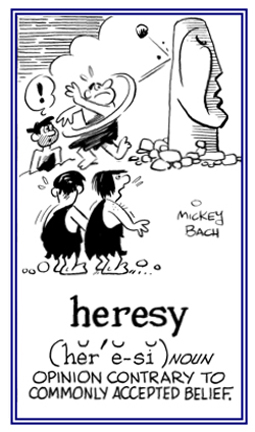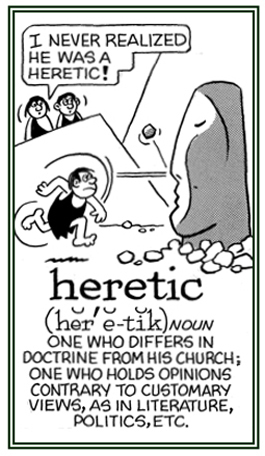heres-, heretic-
(Greek > Latin: a taking, choosing, a choice; to take for oneself)
hearsay, heresy
hearsay (HIR say") (noun)
Information or evidence that is obtained through a secondary or indirect source: The witness was told that he could not use hearsay in court.
heresy (HER i see) (noun)
1. Dogma or doctrine held by an individual or a group of individuals which is perceived as unacceptable or different to that of another religious group: The elderly priest considered the sermons, preached in the church across the street, as heresy.
2. An opinion or belief that is held contrary to generally accepted standards or practices: In a household of people who love cats, it is almost heresy to admit to being fond of dogs.
2. An opinion or belief that is held contrary to generally accepted standards or practices: In a household of people who love cats, it is almost heresy to admit to being fond of dogs.
Before communication technology improved, there was always the risk that hearsay could be interpreted as heresy and get people into trouble.
heresiarch
A founder or leader of heresy.
heresimach
heresimachia
Active opposition to heresy and heretics.
heresiography
A treatise or written documentation about heresies.
heresiologist
A student or specialist of heresies.
heresiology
The study of heresies.
1. An unorthodox belief or doctrine; especially as regards some theological or church beliefs or "orthodox" doctrines: If a Catholic priest gets married, he has committed heresy.
2. A negative belief or doctrine, as in politics, philosophy, or science and the adherence to such controversial or unorthodox opinions: Heresy is an opinion which disagrees with or conflicts with those who generally accept something as being authoritative, proper, or correct.

© ALL rights are reserved.
Go to this Word A Day Revisited Index
2. A negative belief or doctrine, as in politics, philosophy, or science and the adherence to such controversial or unorthodox opinions: Heresy is an opinion which disagrees with or conflicts with those who generally accept something as being authoritative, proper, or correct.

Go to this Word A Day Revisited Index
so you can see more of Mickey Bach's cartoons.
An excessive fear of challenges to official religious doctrine or a dread of radical deviations from the "orthodox" view: Sally went to church every Sunday like she had been doing all of her life, and was frightened of extreme and non-sacred ways of thinking and behaving, and, affected by heresyphobia, avoided everything having to do with questioning the teachings of the church.
1. A professed believer in God who has certain religious opinions which are contrary to those accepted by his or her church or who rejects some doctrines that are considered to be correct by that religion: Martin Luther was a German theologian and leader of the Reformation who was considered to be a heretic by the Catholic hierarchy because of his opposition to the wealth and corruption of the papacy and his belief that salvation was granted on the basis of faith in God and not by works or deeds.
2. A person who does not conform to an established attitude, doctrine, or principle in politics or any other socially accepted custom or belief: Alice was a finance officer who didn’t mind being named a heretic when she decided to donate some of the profits of the company to a charity organization instead of giving all of the managers another raise.

© ALL rights are reserved.
Go to this Word A Day Revisited Index
2. A person who does not conform to an established attitude, doctrine, or principle in politics or any other socially accepted custom or belief: Alice was a finance officer who didn’t mind being named a heretic when she decided to donate some of the profits of the company to a charity organization instead of giving all of the managers another raise.

Go to this Word A Day Revisited Index
so you can see more of Mickey Bach's cartoons.
heretical
hereticalness
1. Of or relating to heresy or heretics.
2. Characterized by, revealing, or approaching departure from established beliefs or standards.
2. Characterized by, revealing, or approaching departure from established beliefs or standards.
hereticaster
A petty or contemptible heretic.
hereticate
1. To declare to be heretical.
2. To decide to be heresy or a heretic.
3. To denounce as a heretic or heretical.
2. To decide to be heresy or a heretic.
3. To denounce as a heretic or heretical.
Etymology of the words heresy and heretic
- In ancient Greek, the verb hairein, meaning "to take", gave rise to the adjective hairetos "able to choose" and the noun hairesis "the act of choosing".
- In time the noun developed the extended senses of a "a choice", "a course of action", "a school of thought", and "a philosophical or religious sect". Stoicism was considered a hairesis
- Within Judaism, a heresy (our Modern English equivalent and derivative of hairesis) was a religious faction, party, or sect; such as, the Pharisees or Sadducees.
- Applied to such groups, hairesis was used in a neutral, nonpejorative manner.
- In fact, when this Greek noun is used in the New Testament (Bible), it is usually translated as sect.
- By the end of the second century, haeresis (the Latin equivalent) was being applied to an organized body holding a false or sacrilegious doctrine.
- From this use, it took on the sense of "a body of doctrine substantially differing in some aspect from the doctrine taught by the Church".
- The Catholic Church used the Latin haeresis (from the Greek hairesis) for "heresy" and haereticus (from the Late Greek hairetikos, a derivative of hairetos "able to choose") for "heretic".
- These two words were taken into early French as heresie/eresie and heritique/eritique and then into English in the thirteenth and fourteenth centuries, respectively, as heresy an heretic.
- Their religious senses passed into English as well.
- In Chaucer's time, c. 1385, the noun began to take on a nonecclesiastical use, being applied to any dissenting opinion, belief, or doctrine in any field.
- At about the same time we also find this noun being used for "a school of thought, a sect", echoing the ancient Greek use of hairesis.
Showing page 1 out of 2 pages of 16 main-word entries or main-word-entry groups.

